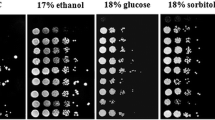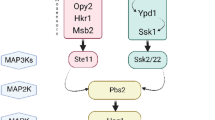Summary
Heat shock and ethanol stress of brewing yeast strains resulted in the induction of a set of proteins referred to as heat shock proteins (HSPs). At least six strongly induced HSPs were identified in a lager brewing strain and four HSPs in an ale brewing strain. Four of these HSPs with molecular masses of approximately 70, 38, 26 and 23 kDa were also identified in two laboratory strains ofSaccharomyces cerevisiae. The appearance of HSPs correlated with increased survival of strains at elevated temperatures and high concentrations of ethanol. These results suggest that HSPs may play a role in the ethanol and thermotolerance of yeasts. The properties of these proteins and membrane fatty acids in relation to heat and ethanol shock are being investigated.
Similar content being viewed by others
References
Bossier, P., I.T. Fitch, H. Boucherie and M.F. Tuite. 1989. Structure and expression of a yeast gene encoding the small heat shock protein HSP26. Gene 78: 323–330.
Brazzell, C. and T.D. Ingolia. 1984. Stimuli that induce a yeast heat shock gene fused to β-galactosidase. Mol. Cell Biol. 4: 2573–2579.
Cavicchioli, R. and K. Watson, 1986. Loss of heat shock acquisition of thermotolerance in yeast is not correlated with loss of heat shock proteins. FEBS Lett. 207: 149–152.
D'Amore, T., G. Celotto, I. Russell and G.G. Stewart. 1989. Selection and optimization of yeast suitable for ethanol production at 40°C. Enzyme Microb. Technol. 11: 411–416.
Dowhanick, T., J. Sobczak, I. Russell and G.G. Stewart. 1990. The rapid identification by protein fingerprinting of yeast and bacterial brewery contaminants. J. Am. Soc. Brew. Chem. 48: 75–79.
Hall, B.G. 1983. Yeast thermotolerance does not require protein synthesis. J. Bacteriol. 156: 1363–1365.
Iida, H. and I. Yahara. 1984. Heat shock resistant mutant ofSaccharomyces cerevisiae shows constitutive synthesis of two heat shock proteins and altered growth. J. Cell. Biol. 99: 1441–1450.
Laemmli, U.K. 1970. Cleavage of structural proteins during the assembly of the head of bacteriophage T4. Nature 277: 680–685.
Li, G.C. 1983. Induction of thermotolerance and enhanced heat shock protein synthesis in Chinese hamster fibroblasts by sodium arsenite and by ethanol. J. Cell. Physiol. 115: 116–122.
Li, G.C. and Z. Werb. 1982. Correlation between synthesis of heat shock proteins and development of thermotolerance in Chinese hamster fibroblasts. Proc. Natl. Acad. Sci. U.S.A. 79: 3218–3222.
Li, G.C., E.C. Shiu and G.M. Hahn. 1980. Similarities in cellular inactivation by hyperthermia or by ethanol. Rad. Res. 82: 257–268.
Lindquist, S. 1986. The heat shock response. Annu. Rev. Biochem. 55: 1151–1191.
Lindquist, S. and E.A. Craig. 1988. The heat shock proteins. Annu. Rev. Genet. 22: 631–677.
Loomis, W.F. and S.A. Wheeler. 1980. Heat shock response ofDictyostelium. Dev. Biol. 79: 399–408.
McAlister, L. and D.B. Finkelstein. 1980. Heat shock proteins and thermal resistance in yeast. Biochem. Biophys. Res. Commun. 93: 819–824.
McAlister, L., S. Strausberg, A. Kulaga and D.B. Finkelstein. 1979. Altered patterns of protein synthesis induced by heat shock of yeast. Curr. Genet. 1: 63–74.
Michel, G.P.F. and J. Starka. 1986. Effect of ethanol and heat stresses on the protein pattern ofZymomonas mobilis. J. Bacteriol. 165: 1040–1042.
Miller, M.J., N.H. Xuong and E.P. Geiduschek. 1982. Quantitative analysis of the heat shock response ofSaccharomyces cerevisiae. J. Bacteriol. 151: 311–327.
Mitchell, H.K., G. Muller, N.S. Peterson and L. Lipps-Sarmiento. 1979. Specific protection from phenocopy induction by heat shock. Dev. Genet. 1: 181–192.
Plesofsky-Vig, N. and R. Brambl 1985. The heat shock response ofNeurospora crassa: protein synthesis and induced thermotolerance. J. Bacteriol. 162: 1083–1091.
Plesset, J., C. Palm and C.S. McLaughlin. 1982. Induction of heat shock proteins and thermotolerance by ethanol. Biochem. Biophys. Res. Commun. 108: 1340–1345.
Schlesinger, M.J., M. Ashburner and A. Tissieres eds. 1982. Heat Shock from Bacteria to Man, Cold Spring Harbor Laboratory, Cold Spring Harbor, NY.
Schlesinger, M.J. 1986. Heat shock proteins: The search for functions. J. Cell. Biol. 103: 321–325.
Susek, R.E. and S.L. Lindquist. 1989. HSP 26 ofSaccharomyces cerevisiae is related to the super family of small heat shock proteins but is without a demonstrable function. Mol. Cell. Biol. 9: 5265–5271.
Tuite, M.F., N.J. Bentley, P. Bossier and I.T. Fitch. 1990. The structure and function of small heat shock proteins: analysis of theSaccharomyces cerevisiae HSP 26 protein. Antonie van Leeuwenhoek 58: 147–154.
Watson, K., R. Cavicchioli and G. Dunlop. 1984. A primary and secondary heat shock induction of thermal and ethanol tolerance in yeast. Proc. 18th Conv. Inst. Brew. Australia and New Zealand section, pp. 229–235.
Watson, K., G. Dunlop and R. Cavicchioli. 1984. Mitochondrial and cytoplasmic protein synthesis are not required for heat shock acquisition of ethanol and thermotolerance in yeast. FEBS Lett. 172: 299–302.
Watson, K. and R. Cavicchioli. 1983. Acquisition of ethanol tolerance in yeast cells by heat shock. Biotechnol. Lett. 5: 683–688.
Yost, H.J., R.B. Peterson and S. Lindquist. 1990. In: Stress Proteins in Biology and Medicine. (Morimoto, R., A. Tissieres and C. Georgopoulos, eds.) 379–409, Cold Spring Harbor Laboratory Press, NY.
Author information
Authors and Affiliations
Rights and permissions
About this article
Cite this article
Odumeru, J.A., D'Amore, T., Russell, I. et al. Changes in protein composition ofSaccharomyces brewing strains in response to heat shock and ethanol stress. Journal of Industrial Microbiology 9, 229–234 (1992). https://doi.org/10.1007/BF01569628
Received:
Revised:
Accepted:
Issue Date:
DOI: https://doi.org/10.1007/BF01569628




